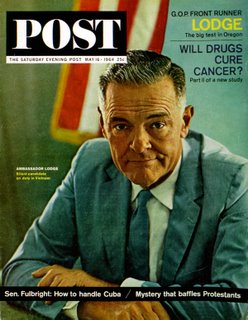Good For You, But Hard to Take

"Lodge had the old New England disdain for the New York money men, plus a manner of aristocratic haughtiness that chilled even the oldest New Yorkers. There was no doubt that money could be raised for Lodge in downtown New York . . . but not much enthusiasm. He was like medicine -- good for you, but hard to take." -- Theodore White.
The grandson of U.S. senator Henry Cabot Lodge, Henry Cabot Lodge, Jr. was born (on this day in 1902) of Massachusetts blue-blood stock. He entered politics in 1932, winning election to the Massachusetts House as a Republican, and 4 years later, at the age of 34, he was elected U.S. senator from Massachusetts. He initially aligned himself with the Robert Taft conservatives, and was an opponent to U.S. entry into World War II, saying "it is not our fight." After the U.S. did enter the War, however, Lodge in 1944 became the first person to leave the Senate to join the military since the Civil War.
After U.S. Tank Corps service in the War he won re-election to the Senate and reversed himself on U.S. isolation, declaring that the best hope for world peace was the United Nations. He served as Dwight Eisenhower’s floor manager at the 1952 Republican Convention, helping Eisenhower to secure the nomination over Taft. But even as Eisenhower won the general election, Lodge lost his Senate seat to a young congressman, John F. Kennedy; Eisenhower rewarded Lodge for his efforts, however, by appointing him Ambassador to the United Nations.
Mentioned as a possible successor to Eisenhower as early as 1956, Lodge gained international notoriety as he waged the battle of the cold war in the U.N. Security Council, responding to Soviet protests over the U-2 spy plane flight of Francis Gary Powers and leveling charges of espionage against the Soviets in turn. In 1960, Republican presidential nominee Richard Nixon asked Lodge to be his running mate, but during the 1960 campaign Lodge flouted Republican strategists’ advice by promising during a campaign visit to Harlem that, if elected, Nixon would appoint an African-American to his cabinet. The promise did not sit well with Southern voters at the time, and was another in a long list of reasons why Nixon lost to Lodge’s old nemesis John Kennedy in the general election.
In 1963, Kennedy appointed Lodge as Ambassador to South Vietnam, perhaps in an attempt to depoliticize the growing conflict there, but by the following year, former president Eisenhower was urging Lodge to return to the U.S. to seek the presidency as a moderate "common sense" candidate. He took an early lead in the 1964 Republican primaries by winning New Hampshire as a write-in, but fell away early, finding himself splitting the moderate field with Nelson Rockefeller as Barry Goldwater marched on to receive the Republican nomination. He later served as Ambassador to West Germany, chief U.S. negotiator at the Paris Vietnam peace talks (1969) and special envoy to the Vatican. He died on February 27, 1985.





0 Comments:
Post a Comment
Subscribe to Post Comments [Atom]
<< Home